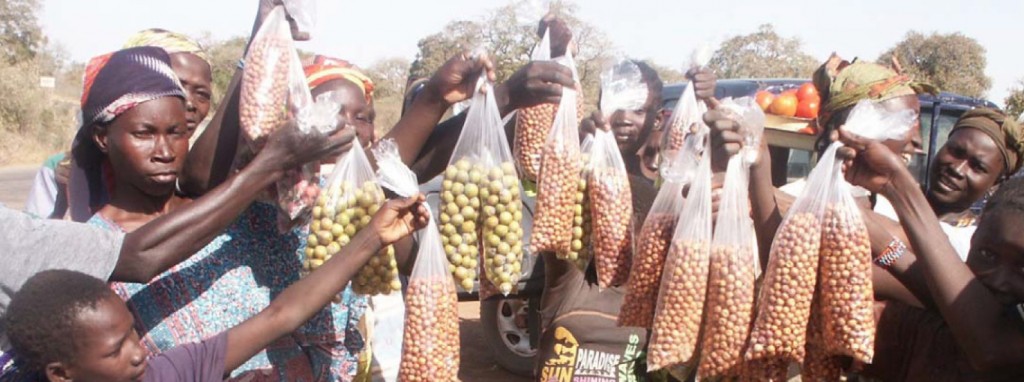Crops for the Future is an organization dedicated to the support, collection, synthesis, and promotion of neglected and underutilized plant species for the benefit of the poor and the environment. It evolved from the International Centre for Underutilised Crops and the Global Facilitation Unit for Underutilized Species.
Hunger and malnutrition are still prevalent in Africa and South Asia. Combined with diet-related diseases, the world needs new approaches to food and nutrition security. Trade globalization and modernization have favored a few major food crops that dominate international agricultural production, processing, and commerce. A number of food species fallen into disuse and are replaced by the major crops. Worse, by-products of the neglected species like fibre, medicine, fodder, or construction material are affected. Sketchy information and a poor knowledge base about neglected and underutilized crops limit their potential to create more livelihoods. Unfavorable policies also hamper the wider use of these plants and plant-products, creating barriers for producers to access markets.
The strength of neglected and underused plant species is their significant contribution for a richer economic, social and cultural diversity. Many have the potential to play a more important role in sustaining livelihood, and enhancing the health and stability of ecosystems. In addition, agrobiodiversity increases the options for adaptation and mitigation of climate changes.
Crops for the future helps provide an enabling environment for researchers and experts to address the increasing international call for the better use of neglected resources for future generations. Specifically, Crops for the Future aims to:
1. Enhance production and consumption of neglected/underutilized crops.
2. Increase income for producers through better marketing and post-harvest treatments.
3. Improve the nutritional status of the society through higher consumption of neglected/underutilized crops.
4. Increase resilience to change and shocks through diversified production and improved production systems.
Strategic Objectives and Activities
1. Increase the knowledge base for neglected/underutilized crops, especially in the areas of sustained market access, nutritional security, and health and climate change.
Programs:
a. Leading the Coalition to Diversify Income through Underused Crops
- Collaboration with community and research partners in India and Vietnam.
- Scaling up research findings.
- Integrated approach to processing and marketing of niche crops.
b. Research collaboration with University of Nottingham Malaysia Campus
2. Advocate a favorable policy environment to promote the use of neglected/underutilized crops.
Programs:
a. Continued engagement in the revision of EU Novel Food Regulation.
b. Close collaboration with Biodiversity International in governance bodies such as the Treaty for Plant Genetic Resources.
3. Increase awareness on the potential and contributions of neglected/underutilized crops for livelihoods and well-being.
Programs:
a. Dynamic news service and information portal at our website: www.cropsforthefuture.org
b. Production of information materials and scientific publications.
c. Participation in international events and fairs.
4. Strengthen the capacity in relevant sectors at different levels.
a. Providing support to expert consultation and training workshop “Crops for the Future in the Pacific”.
b. Providing support to participants at the All African Horticulture Congress.
c. Collaboration with Wageningen University in development of training components on niche crop management.
The organization is registered in the United Kingdom. It is hosted by Biodiversity International in Malaysia to retain a “Southern” focus. It has a small Board of Directors with individuals selected on merit. Likewise, a lean staff structure for the secretariat is implemented to ensure that most funds are used for operations.
Partnerships
Crops for the Future builds upon an extensive existing network of partners, including international and national research institutes, development NGOs, intergovernmental organizations, and advanced research institutes. Current consortium partners Biodiversity International and University of Nottingham Malaysia Campus provides links to the (Consultative Group on International Agricultural Research) CGIAR, academia, and the private sector. Crops for the Future also works with networks such as International Tropical Fruits Network, Global Horticulture Initiative, Global Forum for Agricultural Research, Asia-Pacific Association of Advanced Research Institutes, Forum for Agricultural Research in Africa, International Society for Horticultural Sciences, and others. Staff members of the organization are also chairing various working groups and discussion fora.
 Contact information
Contact information
Website: www.cropsforthefuture.org
P.O. Box 236, UPM Post Office
43400 Serdang Darul Ehsan, Malaysia
Tel: +603 8942 3891
Fax: +603 8948 7655
or contact Michael Hermann:
m.hermann@cropsforthefuture.org

